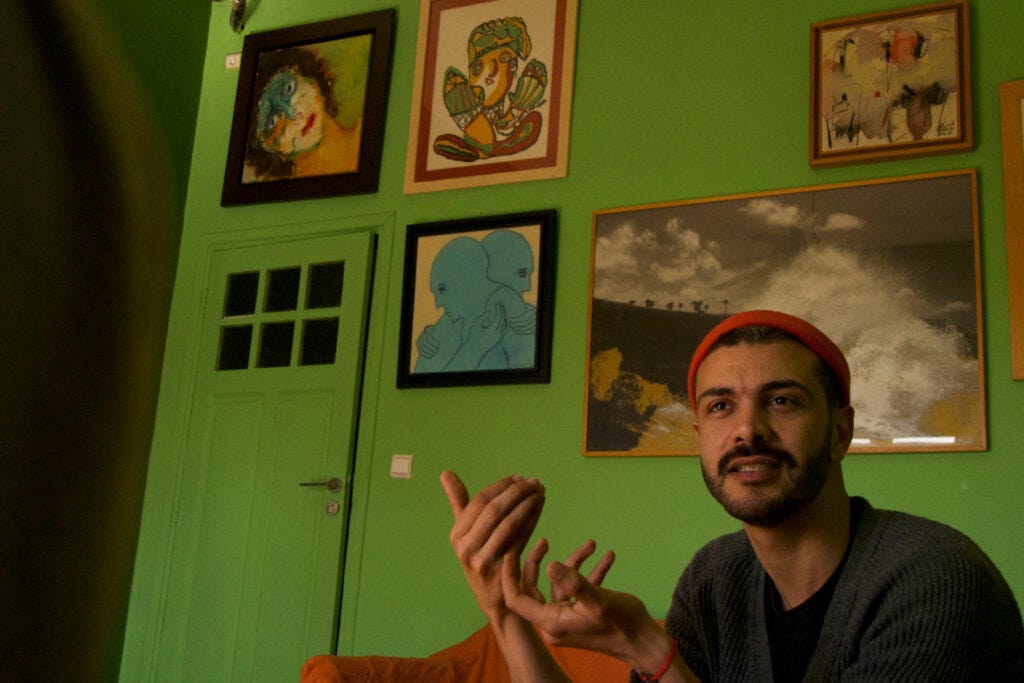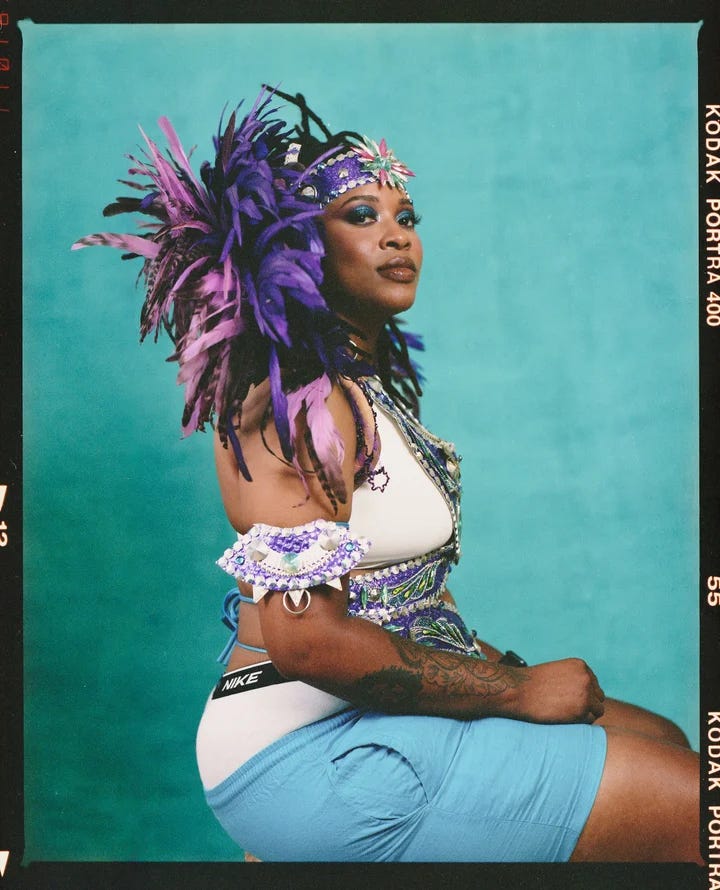Global Roundup: Women in Sudan, Football Sparks Global Conversation on Sexism, Morocco Queer Activist & Podcaster, Cuba Women Boxers, Black Queer Joy at Carnival
Curated by FG Contributor Samiha Hossain
Sudanese women protesting in Khartoum in July 2022. Photograph: AFP/Getty Images
CW: Sexual violence and rape
Women in Sudan are facing rampant sexual violence – reported cases are almost all by the Rapid Support Forces (RSF) paramilitary group and are just the tip of the iceberg, say campaign groups. Sulima Ishaq is head of the country’s Combating Violence against Women and Children unit. It is her job to document sexual violence, which has now become systematic. Ishaq and her team usually act on tipoffs from doctors and nurses. Sometimes, late at night, she receives calls directly from survivors, who tell her about their ordeals.
Sometimes the documentation process itself is very painful. It is impossible to disconnect. -Sulima Ishaq
The fighting in Sudan started in April as the two main factions of the military regime are fighting for power. It has killed at least 4,000 people and forced 4.5 million from their homes. Most of it has centred on Darfur and Khartoum where there have been fierce battles in residential neighbourhoods. So far, Ishaq and her team have verified 124 rapes, although the true number is likely in the thousands. Poor phone connections, constant power cuts, the difficulty of tracking survivors who have fled to Chad and other neighbouring countries as well as fear of reprisals prevent survivors from speaking out.
The Darfur Women Action Group and the Strategic Initiative for Women in the Horn of Africa (SIHA), two campaign groups, have both documented cases of women being kidnapped by the RSF for ransom. They are often raped while they are held hostage. Many have been taken to Chad or kept as sex slaves. Several rapes documented by SIHA in Khartoum happened when women tried to retrieve documents from their abandoned homes, only to find them occupied by the RSF. Other women were seized from the streets.
Ishaq fears the level of sexual violence will increase if the fighting reaches new areas. She is also worried about the mental health of her staff as they continue their documentation work.
We are being traumatised. In our nightmares, we carry the stories of the agony, the struggle and the pain. -Sulima Ishaq
People protest against Luis Rubiales in Madrid on Monday. Photo by Reuters
Spain's top criminal court on Monday launched a preliminary investigation into whether his actions amounted to a crime of sexual assault. Rubiales has strenuously denied any wrongdoing. He claims the kiss was consensual and that he is the victim of a "social assassination". Hermoso has stated there was no consent.
Teresa Parker from Women's Aid, a charity that supports women and children facing abuse, says the way the incident has played out so far has resonated with many women.
This is exactly why many women do not come forward to report harassment or abuse. We are being asked to ignore what you can see on film, and to dismiss a woman when she says she didn't consent. It is an outrageous situation. -Teresa Parker
To many people, the presence of video footage leaves little room for doubt about what happened.
The irony is that women are so often told an allegation is meaningless without evidence. But what we can see from this case is that even when the evidence is iron-clad the woman is disbelieved anyway, so we really can't win. -Laura Bates, founder of the Everyday Sexism Project
Many in Spain’s football world are standing by Hermoso, releasing statements, resigning and refusing to play. Regional leaders within the Spanish football federation have called on Rubiales to resign. Speaking on BBC Radio 5 Live, football presenter and journalist Semra Hunter says she has never seen Spanish society "come together so unanimously... and agree this was completely inappropriate behaviour". Still, many continue to defend Rubiales, including his mother, who briefly went on hunger strike.
Soufiane Hennani at his apartment in Rabat. (Photo by Rishabh R. Jain for Democracy in Exile)
Soufiane Hennani is a queer activist and the producer of "Machi Rojola," a popular French-language podcast in Morocco rethinking masculinity. Its name is a popular expression in Moroccan Arabic that translates roughly as "it's not masculine"—a phrase often used to suggest someone is "not a man," with all the implied stereotypes about manhood and masculinity. The podcast, as Hennani has said, aims to "reclaim this expression and advocate a plural and inclusive masculinity, instead of an exclusive and toxic one."
Hennani describes Morocco as having a "conservative and closed" society. LGBTQ+ issues are not discussed openly, especially in schools. This silence serves as a kind of censorship-by-omission. He discusses the struggles he faced growing up in a small town.
I was a rebel. It was the marker of my character as a teenager, that I don't accept the order of society. Even when I was a child, I think I was like this. -Soufiane Hennani
At the start of the COVID-19 pandemic, Hennani decided to take a break from his Ph.D. program to launch a podcast with Elille, a collective he created with his friends to advance gender diversity. The resulting podcast was "Machi Rojola," where he hosts academics and activists working in queer and feminist studies for conversations reimagining masculinity. Hennani crafts his podcast to be accessible to broad audiences. He hopes that people who tune in leave with the understanding that LGBTQ+ issues don't exist in isolation, but rather impact everyone in a country like Morocco.
For instance, the challenges facing queer people in Morocco are deeply interlinked with women's issues. Article 490 of Morocco's penal code criminalizes sex outside of marriage. The law, which dates back to French colonial rule in Morocco, means that both queer people and women who are not married can face prosecution for pursuing their sexual freedoms. Hennani calls the movement to overturn Article 490 the "same fight" for women and queer people—"it's the fight to be free."
This is one of the reasons why we choose masculinity to work on these topics. It's like working on the root, the origin of the problem. Liberating queer people, it's liberation for the whole society. -Soufiane Hennani
Cuban women are fighting to make a name for themselves in the world of boxing that was, until very recently, only open to men. Women had been allowed to train but until recently, were banned from entering the ring to compete or even to spar. That changed in December when the Cuban Boxing Federation lifted its prohibition on women’s boxing and announced the creation of a national women’s team.
While it typically takes talented athletes many years of training to qualify for the Olympics, the women on the Cuban national team – some of whom only put on boxing gloves for the first time seven months ago – are trying to make it to the Paris Olympics next year.
Before my dream was that they approved women’s boxing. Now that it’s approved, my dream has changed: I want to be a champion, win medals, and make history. - Karen Cantillo
The president of Cuba’s Boxing Federation, Alberto Puig de la Barca, told Al Jazeera that the ban on women’s boxing was rooted in safety concerns about whether feminine boxing could damage women’s bodies, especially when they are pregnant. Women boxers must take periodical pregnancy tests now the ban is lifted and women must wear padding for protection. Many see the underlying reason for the foot-dragging as entrenched machismo culture and a paternalistic culture of overprotecting women.
They didn’t want us to box – this was seen as a sport for men, and women were supposed to be at home. -Melany de la Caridad Girado
The 12 women that made the national team – two in each weight category – have now given up their day jobs and, like all elite Cuban athletes, receive a salary – although their living conditions are spartan: the team sleeps in bunk beds and must wash with buckets of cold water. The team made their international debut this April in the ALBA Games, a tournament open to mainly left-wing Latin American and Caribbean nations. The top six fighters went to the Central American and Caribbean Games in San Salvador in June. They brought back two bronzes and a silver medal.
Abi. PHOTO: BRIANNA ROYE
Wanna Thompson’s vibrant photo series celebrates black queer joy at carnival. The long, centuries-old tradition of “playing mas” sees individuals assume roles of traditional characters and adorn themselves in ornate costumes to march and dance alongside carnival bands. Thompson observed that there were no photo series dedicated to capturing queer individuals who participate in Mas or those who have refrained from doing so due to concerns about acceptance.
Thompson started with the photo series "For she/for he/for them" as a heartfelt tribute to queer individuals who find solace and happiness in Mas despite the ignorance they face in the world. The photo series led to “Portraits of Mas”, which stands as a visual project with the goal of spotlighting the rich, multi-faceted history of Carnival through the medium of portraiture. Thompson enlisted Brianna Roye, a queer masc woman of Jamaican heritage, to photograph the project.
Photographing ‘Portraits of Mas' was my way of carving out a space for myself, and for other people like me. Visually seeing queer people in costume, especially masculine presenting people made me feel seen and empowered. -Brianna Roye
Born in Jamaica, Darynel Weekly started playing mas recently, and what was once a fear, has evolved into a full-blown love affair for the road, which he likens to a sanctuary. Thompson says Weekly was completely aligned with the central theme of the introductory series, where he felt he could be open and experience a sense of belonging.
We're often excluded from Caribbean identity in general, a lot of the times queer people feel a lack of statehood when it comes to representation. And I think, at the very center of this project it's seen that, like, regardless of what your sexual identity or whatever identity that you find yourself attached to within this lifetime, it should not limit how Caribbean you are. -Darynel Weekly
The primary objective of the project is to continue celebrating the beauty, resilience, and multifaceted nature of Mas, as well as showcasing every aspect of Caribbean culture, according to Thompson. Thompson’s ultimate mission is to archive the many faces of Mas.
Samiha Hossain (she/her) is an aspiring urban planner studying at Toronto Metropolitan University. Throughout the years, she has worked in nonprofits with survivors of sexual violence and youth. Samiha firmly believes in the power of connecting with people and listening to their stories to create solidarity and heal as a community. She loves learning about the diverse forms of feminist resistance around the world.





